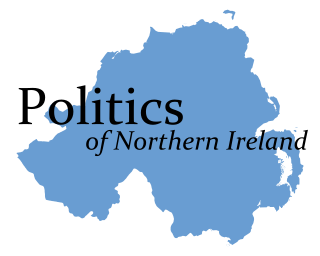Related Research Articles

The Ulster Unionist Party (UUP) is a unionist and conservative political party in Northern Ireland. Having gathered support in Ulster, the northern province in Ireland, during the late-nineteenth and early-twentieth centuries, the party governed Northern Ireland between 1921 and 1972. The UUP and its predecessors have been the traditional Unionist voice in Ireland. It was supported by most unionist voters throughout the conflict known as the Troubles, during which time it was often referred to as the Official Unionist Party (OUP). Between 1905 and 1972, its peers and MPs took the Conservative whip at Westminster, in effect functioning as the Northern Irish branch of the Conservative and Unionist Party. This arrangement came to an end in 1972 over disagreements over the Sunningdale Agreement. The two parties have remained institutionally separate ever since, with the exception of the 2009–2012 Ulster Conservatives and Unionists electoral alliance.

James Dawson Chichester-Clark, Baron Moyola, PC, DL was the penultimate Prime Minister of Northern Ireland and eighth leader of the Ulster Unionist Party between 1969 and March 1971. He was Member of the Northern Ireland Parliament for South Londonderry for 12 years, beginning at the by-election to replace his grandmother Dehra Parker in 1960. He stopped being an MP when the Stormont Parliament was suspended and subsequently abolished with the introduction of Direct Rule by the British Government.

The Northern Ireland Assembly was a legislative assembly set up by the Government of the United Kingdom on 3 May 1973 to restore devolved government to Northern Ireland with the power-sharing Northern Ireland Executive made up of unionists and nationalists. It was abolished by the Northern Ireland Act 1974.
The Northern Ireland Conservatives is a section of the United Kingdom's Conservative Party that operates in Northern Ireland. The party won 0.3% of the vote in the 2017 Northern Ireland Assembly election and 0.7% of the vote in the 2019 United Kingdom General election in Northern Ireland.
The Down by-election was held on 6 June 1946, following the death of James Little, the independent Unionist Member of Parliament for Down.
The 1952 Belfast South by-election was held following the resignation of Ulster Unionist Party (UUP) Member of Parliament, Hugh Gage.
This is a list of people who served as Chief Whip of the Ulster Unionist Party in the Parliament of the United Kingdom, the Parliament of Northern Ireland and the Northern Ireland Assembly.
The 1940 Belfast East by-election was held on 8 February 1940. The by-election was held due to the elevation to the peerage of the incumbent UUP MP, Herbert Dixon. It was won by the UUP candidate Henry Peirson Harland, who was unopposed.
The 1943 Antrim by-election was held on 11 February 1943. The by-election was held due to the death of the incumbent UUP MP, Joseph McConnell. It was won by the UUP candidate John Dermot Campbell.
The 1929 Londonderry by-election was held on 29 January 1929. The by-election was held due to the appointment as high court judge of the incumbent UUP MP, Malcolm Macnaghten. It was won by the UUP candidate Ronald Deane Ross.
The 1922 North Down by-election was held on 21 July 1922. The by-election was held due to the assassination of the incumbent UUP MP, Henry Wilson who had been elected in the February 1922 North Down by-election. It was won unopposed by the UUP candidate John Simms.
The 1922 North Londonderry by-election was held on 2 June 1922. The by-election was held due to the death of the incumbent UUP MP, Hugh T. Barrie. It was won by the UUP candidate Malcolm Macnaghten.
The 1922 South Londonderry by-election was held on 18 January 1922. The by-election was held due to the death of the incumbent UUP MP, Robert Chichester who had won a by-election the previous August. It was won unopposed by the UUP candidate Sir William Hacket Pain.
The 1921 Mid Down by-election was held on 2 July 1921. The by-election was held due to the incumbent Ulster Unionist MP, James Craig, being elected Prime Minister of Northern Ireland. It was won by the UUP candidate Robert Sharman-Crawford.
The 1921 Mid Armagh by-election was held on 23 June 1921. The by-election was held due to the death of the incumbent Ulster Unionist MP, James Rolston Lonsdale. It was won unopposed by the UUP candidate Henry Bruce Armstrong.
The 1921 Belfast Duncairn by-election was held on 23 June 1921. The by-election was held due to the incumbent Ulster Unionist MP, Edward Carson, being appointed Lord of Appeal in Ordinary. It was won by the UUP candidate Thomas Edward McConnell, who was unopposed. The seat was abolished in 1922.
The West Down by-election to the Westminster parliament was held on 5 July 1921. The by-election was held due to the appointment as Recorder of Belfast of the incumbent UUP MP, Daniel Martin Wilson. The UUP candidate Thomas Browne Wallace was elected unopposed.
The 1921 Chichester by-election was held on 23 April 1921. The by-election was held due to the resignation of the incumbent Coalition Conservative MP, Lord Edmund Talbot. It was won by the Coalition Conservative candidate William Bird, who was unopposed.

The 1924 Northern Irish local elections were held in January & June 1924 for the various county & district councils of Northern Ireland. The election followed changes by the Unionist government, which had redrawn electoral districts, abolished PR for local elections, and implemented a requirement for members of local authorities to take an oath of allegiance.

The 1970 United Kingdom general election in Northern Ireland was held on 31 March with 12 MPs elected in single-seat constituencies using first-past-the-post as part of the wider general election in the United Kingdom. It was the first general election held after the Representation of the People Act 1969 which reduced the voting age from 21 to 18.